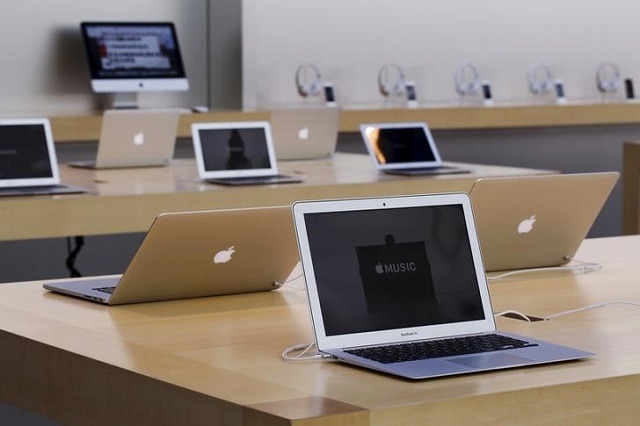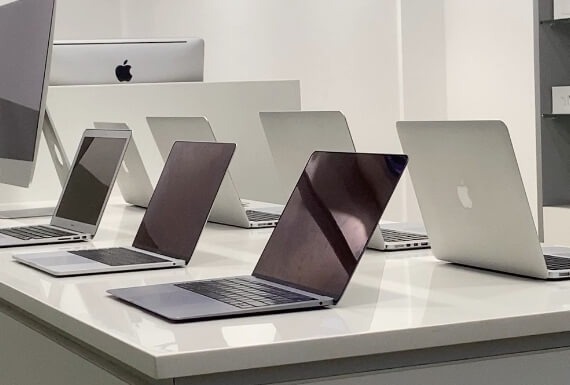Apple has been at the forefront of innovation in the computing industry for decades, and its laptops have played a significant role in shaping the future of computing. While I can’t provide specific information about Apple laptops beyond my knowledge cutoff of September 2021, I can give you an overview of Apple’s approach to laptop design and some trends that may continue to shape the future of Apple laptops.

- Design and Aesthetics: Apple laptops are known for their sleek, minimalist designs and premium build quality. Apple has consistently prioritized aesthetics and has been successful in creating visually appealing and desirable products. The use of aluminum unibody construction, edge-to-edge displays, and thin profiles are some notable design elements that have become synonymous with Apple laptops.
- Integration and Ecosystem: Apple laptops are part of a larger ecosystem of devices and services, including iPhones, iPads, and Apple Watch. Apple has invested heavily in creating a seamless integration between its devices, allowing users to easily transition their work and data between different devices. Features like AirDrop, Handoff, and Continuity have facilitated a more connected and efficient user experience.
- macOS Operating System: Apple laptops run on macOS, the proprietary operating system developed by Apple. macOS offers a distinct user interface and a range of features tailored for productivity and creative tasks. The operating system is known for its stability, security, and tight integration with Apple’s hardware. macOS also provides compatibility with a wide range of software applications, making it a popular choice among professionals and creative users.
- Performance and Power Efficiency: Apple has made significant strides in optimizing the performance and power efficiency of its laptops. By designing their own custom chips, such as the M1 chip introduced in 2020, Apple has been able to deliver impressive processing power while maintaining long battery life. This integration of hardware and software has allowed Apple to achieve better performance per watt compared to traditional laptop architectures.
- Retina Displays and Graphics: Apple has been a leader in high-resolution displays with its Retina technology. Retina displays offer high pixel density, resulting in sharp text, vibrant colors, and excellent image quality. Apple has also focused on improving graphics performance in its laptops, catering to professionals and creative users who rely on powerful graphics capabilities for tasks such as video editing, 3D rendering, and gaming.
- Security and Privacy: Apple has consistently emphasized the importance of security and privacy in its products. Features like Touch ID and Face ID provide secure biometric authentication, while the T2 chip enhances system security and encryption. Apple has also taken steps to protect user privacy by implementing features like Intelligent Tracking Prevention in web browsers and introducing privacy-focused app permissions.
While I can’t predict the specific advancements Apple will introduce in its future laptops, it is likely that they will continue to refine and innovate in these areas. Apple’s commitment to design, integration, performance, and security suggests that future Apple laptops will continue to push boundaries and shape the future of computing.
Advancements in Performance and Efficiency
Advancements in performance and efficiency have been a key focus for Apple, and it’s likely that they will continue to push the boundaries in these areas for future laptops. Here are some potential advancements we may see:
- Custom Chip Development: Apple’s transition to custom silicon, such as the M1 chip, has already shown significant improvements in performance and power efficiency. Future iterations of Apple’s chips could feature even more powerful CPU and GPU cores, allowing for faster processing and rendering capabilities. Additionally, Apple may continue to optimize their chips for specific tasks, such as machine learning or graphics-intensive workloads.
- Improved Thermal Management: Efficient cooling solutions are crucial for maintaining high performance in thin and lightweight laptops. Apple may introduce advanced cooling technologies, such as improved heat pipe designs, vapor chambers, or liquid cooling systems, to ensure sustained performance even during intensive tasks. This could help prevent thermal throttling and maintain optimal performance over extended periods.
- Enhanced Battery Life: Apple’s focus on power efficiency has already resulted in impressive battery life for their laptops. In the future, we can expect even longer battery durations as Apple refines its chip designs and optimizes power management further. Advancements in battery technology, such as higher-capacity cells or more efficient energy utilization, could also contribute to extended battery life.
- Integration of Machine Learning: Apple has been investing in machine learning technologies, and future laptops may leverage these advancements. Machine learning algorithms can optimize various aspects of performance and efficiency, such as adaptive power management, intelligent task scheduling, and dynamic resource allocation. This could lead to more intelligent and efficient use of system resources, resulting in improved overall performance.
- Connectivity and Bandwidth: The future of laptops may involve faster and more versatile connectivity options. Apple could adopt the latest Wi-Fi standards, such as Wi-Fi 6 or Wi-Fi 7, offering faster wireless speeds and improved network efficiency. Additionally, the inclusion of advanced Thunderbolt or USB-C interfaces could enable high-speed data transfer, external GPU support, and versatile peripheral connectivity.
- Cloud-based Computing: With the growing popularity of cloud-based services, Apple may further integrate their laptops with cloud computing platforms. This could involve seamless integration of cloud storage and backup services, as well as the ability to offload resource-intensive tasks to remote servers, reducing the strain on the laptop’s hardware and improving performance for certain applications.
It’s important to note that these advancements are speculative and based on the trends and possibilities within the industry. The exact nature of future performance and efficiency enhancements in Apple laptops will depend on technological advancements, market demands, and Apple’s strategic priorities.

Software and Operating System Updates
Software and operating system updates play a crucial role in enhancing the functionality and user experience of Apple laptops. While I can’t provide specific details about future updates beyond my knowledge cutoff of September 2021, here are some general areas where we might see advancements:
- macOS Improvements: Apple’s macOS is known for its stability, security, and user-friendly interface. Future updates may introduce new features and enhancements to further streamline the user experience. This could include improvements to system performance, refined user interfaces, and additional productivity tools.
- Integration of iOS and macOS: Apple has been working on bringing iOS and macOS closer together, allowing for a more unified experience across devices. We may see further integration of features and functionalities between Apple laptops and iPhones/iPads. This could involve cross-device compatibility for apps, seamless data synchronization, and shared workflows between macOS and iOS.
- Collaboration and Productivity Tools: Apple may continue to develop and expand upon collaboration and productivity tools to cater to the needs of professionals and remote workers. This could include improved integration with communication and collaboration platforms, enhanced file sharing and document collaboration features, and advanced task management capabilities.
- AI and Machine Learning Integration: Apple’s investments in artificial intelligence and machine learning may lead to the integration of these technologies into macOS. Future updates could introduce AI-powered features, such as intelligent virtual assistants, contextual suggestions, and advanced image or text recognition capabilities, further enhancing productivity and user convenience.
- Privacy and Security Enhancements: Apple has a strong focus on user privacy and security. Future updates may introduce additional privacy features and controls, such as expanded options for managing app permissions, enhanced encryption, and improved protection against online tracking. Apple may also continue to refine its security protocols to ensure the safety of user data.
- Enhanced Multitasking and Window Management: Apple may introduce new multitasking features and window management capabilities to improve productivity. This could involve more advanced split-screen modes, improved window snapping, and intuitive gestures for managing multiple apps and windows simultaneously.
- App Ecosystem and Compatibility: Apple’s app ecosystem is a significant aspect of its laptops’ appeal. Future updates may involve better compatibility with a broader range of applications, including support for new technologies and frameworks. Additionally, Apple may introduce tools and resources to facilitate the development of innovative and powerful apps for macOS.
It’s important to remember that these possibilities are speculative, and Apple’s software and operating system updates will depend on their product roadmap, market trends, and technological advancements. The exact features and improvements we’ll see in future updates will be revealed by Apple in due course.
Privacy and Security Enhancements
Privacy and security have been key areas of focus for Apple, and they are likely to continue enhancing these aspects in future updates to their laptops. While I don’t have specific details on future developments beyond my knowledge cutoff of September 2021, here are some general areas where Apple may focus on privacy and security enhancements:
- Stronger User Authentication: Apple may introduce additional measures to strengthen user authentication and ensure that only authorized individuals can access their laptops. This could involve advancements in biometric authentication technologies, such as Face ID or Touch ID, as well as improved passcode options.
- Enhanced Encryption and Data Protection: Apple is known for its strong encryption practices, and future updates may introduce even more robust encryption methods to protect user data. This could involve advancements in encryption algorithms, secure key storage, and encryption options for specific data types, such as individual files or folders.
- Privacy Controls and Transparency: Apple has been proactive in giving users control over their privacy. Future updates may include expanded privacy controls and settings, allowing users to have granular control over app permissions, data sharing, and tracking. Additionally, Apple may continue to improve transparency by providing clearer information on how user data is used and shared.
- Protection against Online Tracking: Apple has taken steps to limit online tracking through features like Intelligent Tracking Prevention in web browsers. Future updates may introduce further measures to protect user privacy by minimizing cross-site tracking and blocking invasive tracking techniques used by advertisers and data brokers.
- Safeguarding App Store Security: Apple may continue to enhance security measures for their App Store to ensure that users can trust the applications they download. This could involve stricter app review processes, more comprehensive malware detection, and additional safeguards against fraudulent or malicious apps.
- Secure Cloud Services: Apple’s cloud services, such as iCloud, may receive further security enhancements to protect user data stored in the cloud. This could involve improved encryption for data transmission and storage, as well as additional authentication measures for accessing cloud services.
- Security Updates and Patch Management: Apple regularly releases security updates and patches to address vulnerabilities and protect against emerging threats. Future updates may continue to prioritize timely delivery of security fixes and improvements to ensure that users have the latest protections against potential security risks.
It’s important to note that these points are general possibilities, and the specific privacy and security enhancements Apple introduces in their laptops will depend on ongoing technological advancements, industry trends, and the company’s commitment to user privacy and security.

Conclusion
Apple laptops have been at the forefront of computing innovation, and their future holds great promise. With a focus on design, performance, and security, Apple is likely to continue shaping the future of computing through its laptops. The evolution of design and form factor may lead to even sleeker and more visually stunning laptops, potentially incorporating foldable or flexible display technology.
Advancements in performance and efficiency will be a priority, driven by Apple’s custom chip development and optimization. Users can expect more powerful CPUs and GPUs, improved thermal management, and longer battery life, enabling them to tackle demanding tasks with ease.
Apple’s commitment to user experience and interconnectivity is expected to lead to further integration with other devices and services, such as iPhones and iPads. This will result in a seamless user experience, allowing for effortless transition and synchronization between devices.
Privacy and security will remain paramount, with Apple likely introducing stronger user authentication methods, enhanced encryption, and more transparent privacy controls. Users can expect continued protection against online tracking and further security measures for the App Store and cloud services.
Software and operating system updates will bring new features, improved productivity tools, and potential integration of AI and machine learning technologies. These updates will aim to provide a more cohesive and intuitive user experience across devices, catering to the needs of both professionals and everyday users.
While the specifics of future Apple laptops are unknown, it is evident that Apple will continue to push the boundaries of innovation, delivering cutting-edge technology and elevating the computing experience. As Apple refines its laptops, users can anticipate a future where performance, design, security, and privacy are seamlessly woven together, empowering individuals to accomplish more and stay connected in a fast-evolving digital world.



